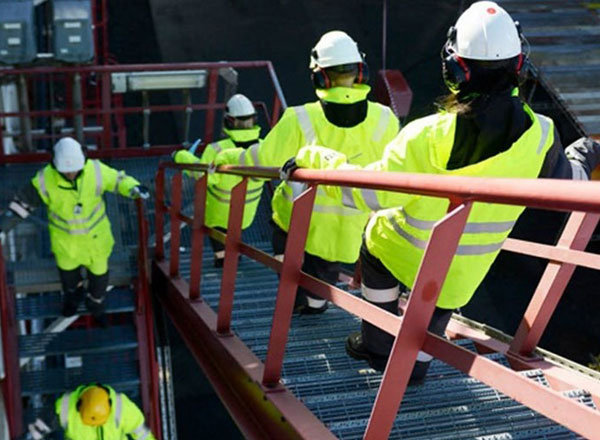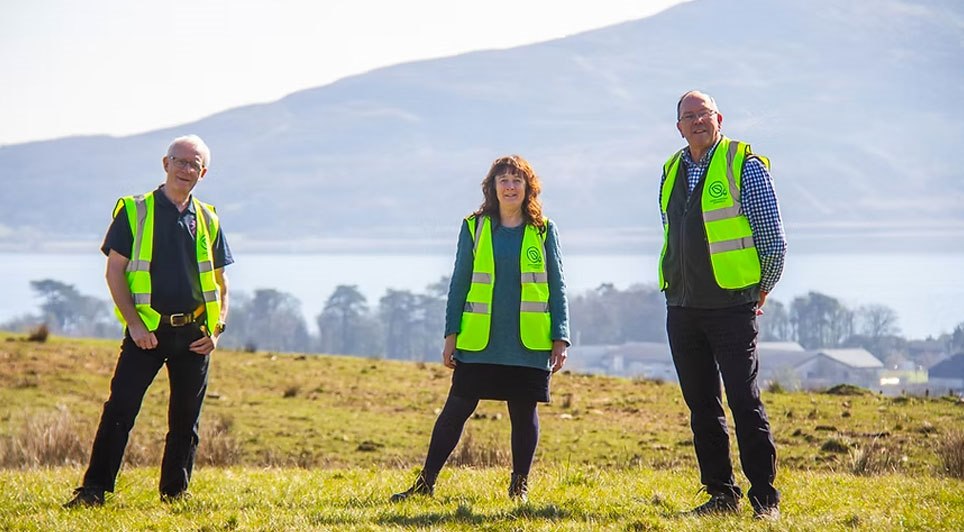High-rise construction site workers are "risking their lives" by not responding immediately to evacuation alarms, new research from the Institution of Occupational Safety and Health (IOSH) has revealed.
According to the IOSH, rather than head straight for the emergency exit, a third of workers who took part in evacuation trials spent more than a minute finishing a task, with the longest time to respond to an alarm being almost six minutes.
And once they completed their task, a quarter undertook four or more other activities, such as collecting tools, prior to starting to evacuate – decisions which can waste critical seconds in a real-life emergency.
Researchers from the University of Greenwich, funded by the Institution of Occupational Safety and Health (IOSH), also found that more than two in five needed their supervisors to instruct them to leave the site, while many believed their employers viewed it more important than they did to complete tasks before evacuating.
The research, called Construction site evacuation safety: evacuation strategies for tall construction sites, marks the first time the behaviour and performance of construction workers during an evacuation has been analysed. It comes as there are a huge number of high-rise buildings being constructed, with an estimated 541 planned in London alone in the coming years.
Two London construction sites took part in the research, with the aim of judging workers' evacuation knowledge and seeing how emergency strategies can be improved by reviewing evacuation response times together with their walking and ascent/descent speeds.
In four full-scale unannounced evacuation trials, involving a total 932 workers, evacuation times from the buildings ranged from nine minutes, 14 seconds to 20 minutes, 47 seconds. These depended on the number of workers involved and what height they were at.
The researchers found that workers located within the formworks of a building respond to an alarm differently to those in the main building. The mean time to respond to an alarm for workers in the main building was 71 seconds while in the formworks it can be as low as 30 seconds. They found that 32 per cent of workers in the main building took more than a minute to "disengage from their pre-alarm activities". In contrast, the average time for supervisors located in the formworks to disengage was only 5.9 seconds which, according to the report, was "an example of the performance of well-trained and highly-motivated staff".
Responses to a questionnaire distributed among workers also highlighted some other concerns. While 82 per cent knew that an evacuation alarm meant they had to leave immediately, only 49 per cent said their first action is to do so. Four in five said they were prompted by an alarm, but video evidence taken during trial evacuations at the site suggested 43 per cent required supervisor intervention.
In their report, the researchers speculate that workers may not be reacting quickly enough because they aren't clear what is meant by 'evacuate immediately'. They recommend enhanced training and greater enforcement of evacuation policies to remedy this.
Professor Ed Galea, who headed up the research team in the Fire Safety Engineering Group at the University of Greenwich, said: "In an emergency evacuation situation, each second can make the difference between life and death. A delayed response poses a significant risk to the health and safety of workers who might need to be evacuated due to a fire, or another on-site emergency.
"One unexpected finding was that workers were not impacted by construction height. This means that people on higher floors and those on lower floors had similar response times. A worker on the 30th floor did not necessary respond to an evacuation alarm any quicker than a worker on the fourth floor.
"This research shows that it is essential to have robust plans in place to ensure the safe and timely evacuation of workers, and it will aid the development of improved procedures and advance the safety of people working on high-rise construction sites."
Duncan Spencer, Head of Advice and Practice at IOSH, also said: "The outcomes from the research will help to improve the safety of construction workers in emergency evacuation when operating in tall building construction environments, by providing a series of suggested improvements and recommendations to be followed by businesses.
"It is clear that these improvements are needed considering that this is one of the most challenging scenarios particularly given the ever-changing nature of the construction site. Response times are slow in many cases. Workers should be evacuating immediately when they hear an alarm, rather than wasting precious seconds on finishing a task. If they don't do so, they are risking their lives because every second counts in an emergency."
The trials took place at 22 and 100 Bishopsgate, both of which are being constructed by Multiplex. The firm has already moved to develop and enhance its safety processes.
Martin Wilshire, Multiplex Health and Safety Director, said: "The research undertaken by Ed Galea and his team on our high-rise projects has highlighted the importance of challenging established industry 'norms' and their origins in creating relevant guidance around safety during tall building construction.
"From our involvement in this work, we have gained a greater understanding of evacuee behaviour and the impact of access constraints such as falsework and surfaces under construction which are unique to our industry. The detail in the research will better inform our approach to risk assessments, particularly in planning for means of escape and improving behaviours in an evacuation scenario."
(MH/JG)
Construction News
04/09/2019
IOSH Raise Concerns Over Workers Ignoring Safety Alarms


15/04/2025
Construction of a £70 million student accommodation development at 292-298 St Vincent Street in Glasgow has reached a significant milestone, with the building now visibly rising from the ground.
Drone footage has captured the progress of the project, which is a partnership between developer Artisa

15/04/2025
Energy regulator Ofgem is expected to confirm today (April 15) its finalised Connections Reform process, designed to expedite grid connections for renewable energy projects that are ready and crucial for achieving the UK's clean power targets for 2030 and beyond.
The new connections system, anticip

15/04/2025
The ambitious transformation of Glasgow’s landmark George Square has moved into a tangible phase with the commencement of the erection of hoardings around the perimeter of the civic space. Starting today, the hoardings will enclose the Square for the duration of its 18-month redevelopment.
The pane

15/04/2025
Members of the public are invited to attend a consultation feedback event to discuss the proposed infrastructure associated with a new underground electricity transmission cable between the Kinardochy and Errochty substations in Perthshire.
The event will take place on Monday, 28 April, from 4 pm t

15/04/2025
Turner & Townsend have been appointed as project managers to develop a business case for the potential extension of the Borders Railway beyond its current terminus at Tweedbank to Hawick and Carlisle.
This key appointment will enable crucial work to progress on the project, including feasibility s

15/04/2025
Arran Community Renewables, a Community Benefit Society based on the Isle of Arran, has secured planning consent for a 6 MW solar farm. The Glenkiln Solar Farm, located approximately 1km west of Lamlash, is projected to generate 5,600MWh of clean renewable energy annually from 2027.
The £5 million

15/04/2025
A new Route Map has been published by the Scottish Land Commission (SLC) to ensure communities across Scotland secure tangible and long-lasting benefits from nature restoration projects and investment in the country's natural environment.
The practical guide is designed for landowners, developers,

15/04/2025
Award-winning principal contractor Procast Group has further expanded its presence across Scotland with the opening of a new base in Dumfries. The Hamilton-based firm has invested £30,000 in a new warehouse and office facility in the Maxwelltown Industrial Estate in Dumfries and Galloway, marking it

14/04/2025
Glasgow City Council's Affordable Housing Supply Programme (AHSP) facilitated the completion of over 1,000 new affordable homes in the city during the past year, despite facing budgetary reductions at the start of the financial year.
The initial grant of £78.687 million from the Scottish Government

14/04/2025
A key phase of Scottish Water's £11.5 million project to upgrade a strategic rising sewer main connecting Renfrew and Glasgow is set to begin, resulting in a significant road closure.
From Monday, 28 April 2025, Ferry Road in Renfrew will be closed to all vehicular traffic for a period of four mont
 Scotland
Scotland UK
UK Ireland
Ireland London
London











